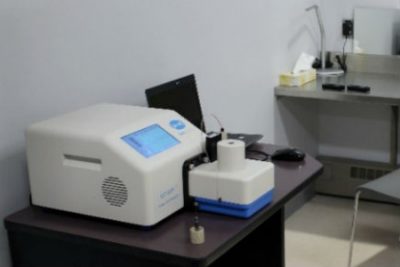 The emergence of highly toxic fentanyl analogues in the unregulated drug market has escalated Canada’s opioid overdose crisis. Until now, people have had no reliable way to identify what is in their drugs prior to using them. A new technology implemented by research partners from the University of Ottawa and Carleton University is changing that, and it has the potential to become a critical new tool in improving the health and safety of communities everywhere.
The emergence of highly toxic fentanyl analogues in the unregulated drug market has escalated Canada’s opioid overdose crisis. Until now, people have had no reliable way to identify what is in their drugs prior to using them. A new technology implemented by research partners from the University of Ottawa and Carleton University is changing that, and it has the potential to become a critical new tool in improving the health and safety of communities everywhere.
The portable mass spectrometer, the first of its kind, will be able to test trace samples of substances in less than 20 seconds and will provide detailed results of the contents, including the presence of fentanyl analogues. Clients using the supervised injection at Ottawa’s Sandy Hill Community Health Centre will now be able to know what is in the drugs they purchased.
‘’Ottawa is experiencing a significant public health crisis in terms of the unacceptable levels of overdose-related deaths and non-fatal overdose events occurring among its citizens. Being able to inform people of the content of the drug, prior to injection, is the right intervention at the right time.” said Lynne Leonard, lead on the research project, Director, HIV and HCV Prevention Team, Assistant Professor in the School of Epidemiology and Public Health at the University of Ottawa.
The research team, comprised of people with lived experience, harm reduction service providers, chemistry and program evaluation experts, as well as social epidemiologists, will implement and evaluate the acceptability and feasibility of a drug-checking program at the supervised injection site using the new technology.
“This unique collaboration of analytical and social sciences will yield unprecedented insight into the opioid crisis that we are facing in this country right now,” explained Jeffrey Smith, director of the Carleton Mass Spectrometry Centre and associate professor in the Department of Chemistry and Institute of Biochemistry at Carleton University.
The research project, funded by the Canadian Institutes of Health Research (CIHR), will provide drug users with immediate information on the safety of their drug sample, allowing for more informed decision making to prevent further unnecessary loss of life due to a contaminated drug supply.
“The Sandy Hill Community Health Centre is pleased to be part of this innovative research project that brings innovative bench science to the injection booth, ‘’ said Rob Boyd, Director of the Oasis program at the Sandy Hill Community Health Center (SHCHC). ‘’Thanks to this research project, what took months for scientists to asses will now take seconds and will allow us to alert the broader community of people who use drugs, as well as first responders.”
This technological advancement may save the lives of those affected by the opioid crisis. With the objective of improving Canadians’ quality of life, the research team hopes to raise awareness on this extremely critical issue.
Media Inquiries:
Steven Reid
Media Relations Officer
Carleton University
613-520-2600, ext. 8718
613-265-6613
Steven_Reid3@Carleton.ca
Thursday, May 3, 2018 in News Releases
Share: Twitter, Facebook



